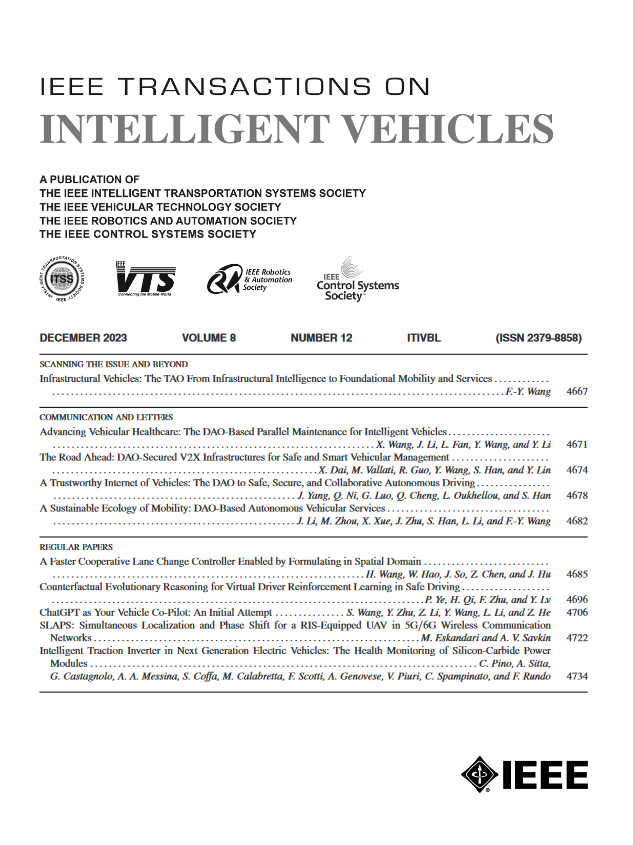Distributed Secure Surrounding Control for Multiple USVs Against Deception Attacks: A Stackelberg Game Approach With Reinforcement Learning
IF 14
1区 工程技术
Q1 COMPUTER SCIENCE, ARTIFICIAL INTELLIGENCE
引用次数: 0
Abstract
This article investigates the Stackelberg game-based distributed secure surrounding control (SSC) problem for multiple unmanned surface vehicles (USVs) with unknown dynamics under deception attacks (DAs). The proposed scheme is rooted in the Stackelberg game with reinforcement learning (RL), in which the attacker and controller respectively play the roles of the follower and leader, making sequential decisions of the DA and the SSC. Specifically, a distributed target estimator is established to access the target position. By utilizing this estimated position to formulate an intermediate control law, the target surrounding scenario is effectively transformed into the Stackelberg game-solving problem. The RL approach with a neural networks-based actor-critic learning structure is deployed to directly derive the distributed optimal SSC and DA policies from the Bellman error, whilst learning the unknown dynamics of USVs. Moreover, a value function decomposition technique is applied optimally for using the designed control parameters, thereby accelerating the acquisition of optimal policies. A rigorous theoretical analysis is employed to ensure the closed-loop stability of multiple USVs. Simulations are provided to validate the effectiveness of the proposed distributed SSC scheme for multiple USVs.针对欺骗攻击的多usv分布式安全周边控制:一种带有强化学习的Stackelberg博弈方法
本文研究了基于Stackelberg博弈的分布式安全周边控制(SSC)问题,该问题适用于具有未知动力学的多艘无人水面车辆(usv)在欺骗攻击(DAs)下。该方案基于Stackelberg博弈和强化学习(RL),其中攻击者和控制器分别扮演追随者和领导者的角色,对DA和SSC进行顺序决策。具体来说,建立了一个分布式目标估计器来访问目标位置。利用该估计位置制定中间控制律,有效地将目标周围情景转化为Stackelberg博弈求解问题。RL方法采用基于神经网络的参与者-评论家学习结构,直接从Bellman误差中导出分布式最优SSC和DA策略,同时学习usv的未知动态。此外,还采用了一种价值函数分解技术来优化控制参数,从而加快了最优策略的获取。通过严格的理论分析,保证了多无人潜航器的闭环稳定性。仿真结果验证了该方案在多无人潜航器环境下的有效性。
本文章由计算机程序翻译,如有差异,请以英文原文为准。
求助全文
约1分钟内获得全文
求助全文
来源期刊

IEEE Transactions on Intelligent Vehicles
Mathematics-Control and Optimization
CiteScore
12.10
自引率
13.40%
发文量
177
期刊介绍:
The IEEE Transactions on Intelligent Vehicles (T-IV) is a premier platform for publishing peer-reviewed articles that present innovative research concepts, application results, significant theoretical findings, and application case studies in the field of intelligent vehicles. With a particular emphasis on automated vehicles within roadway environments, T-IV aims to raise awareness of pressing research and application challenges.
Our focus is on providing critical information to the intelligent vehicle community, serving as a dissemination vehicle for IEEE ITS Society members and others interested in learning about the state-of-the-art developments and progress in research and applications related to intelligent vehicles. Join us in advancing knowledge and innovation in this dynamic field.
 求助内容:
求助内容: 应助结果提醒方式:
应助结果提醒方式:


